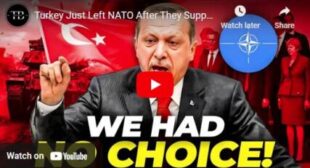
Today’s video delves deep into the seismic event that shook the global stage: Turkey’s withdrawal from NATO. This historic decision followed NATO’s contentious decision to back Israel over Palestine, creating a firestorm of diplomatic tensions and altering Middle Eastern ties.
NATO’s longstanding neutrality in the Israeli-Palestinian conflict, which was intended to maintain regional balance, was shattered when the alliance unambiguously supported Israel. Turkey, which had maintained tight links with the Palestinian Authority and expressed worries about Israel’s actions, was outraged by this strategic shift. The decision to back Israel was a substantial break from NATO’s prior attitude and set in motion a chain of events that redefined alliances and rivalries in the Middle East.
The withdrawal of Turkey from NATO had immediate and far-reaching effects. It undermined NATO’s overall military capabilities, increased concerns about the alliance’s future, and fueled regional tensions, particularly in the Eastern Mediterranean. The realignment of Turkey towards regional powers such as Russia and Iran created a new dynamic, affecting the interests of both previous friends and opponents. Following Turkey’s departure, NATO had the enormous job of adapting to a changed global order, consolidating member unity, and redefining its position in a complicated geopolitical landscape.
The purchase of the Russian S-400 missile system damaged bilateral relations between Turkey and the United States, emphasising the delicate balance between shared interests and conflicts among competitors. Territorial issues in the Eastern Mediterranean remained a source of contention among regional rivals such as Greece, Cyprus, and others, worsened by Turkey’s assertive foreign policy.
The Middle East’s continuous power struggles and realignments increased complexity to an already dangerous region, affecting competitors and friends alike. Turkey’s pro-Palestinian position remained unwavering, although the impact of its advocacy for Palestinian rights in the Israeli-Palestinian conflict remained unknown. The regional dynamics continued to change, influencing the interests of many stakeholders and competitors. Domestic factors such as political polarisation and President Recep Tayyip Erdoan’s leadership style influenced Turkey’s foreign policy decisions.
Turkey had to combine its quest of regional influence with collaboration with erstwhile allies and opponents as it navigated its new role in the Middle East. The narrative of Turkey’s withdrawal from NATO is a fascinating example of the ever-changing nature of international relations in a world of shifting alliances and complex geopolitical problems. Join us as we explore deeper into the implications and consequences of this historic decision and its global influence. Don’t forget to like, subscribe, and click the notification bell to stay up to date on our latest geopolitical and diplomatic observations.
